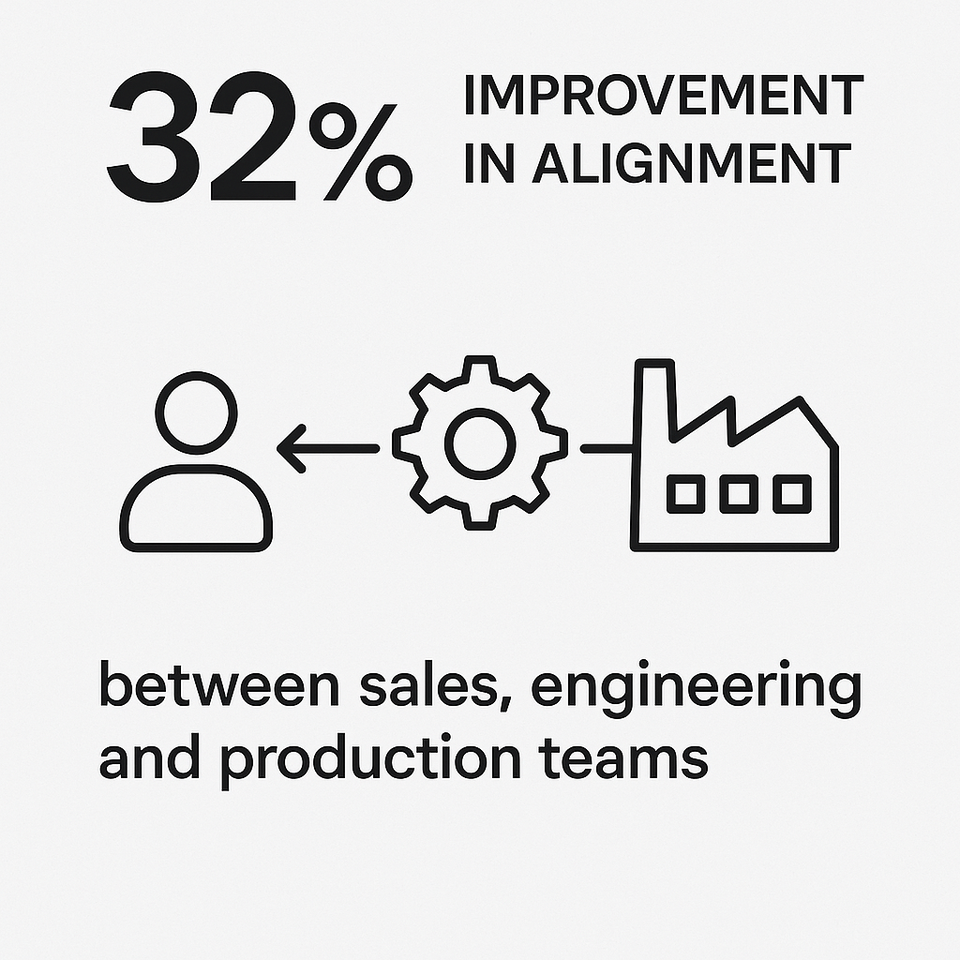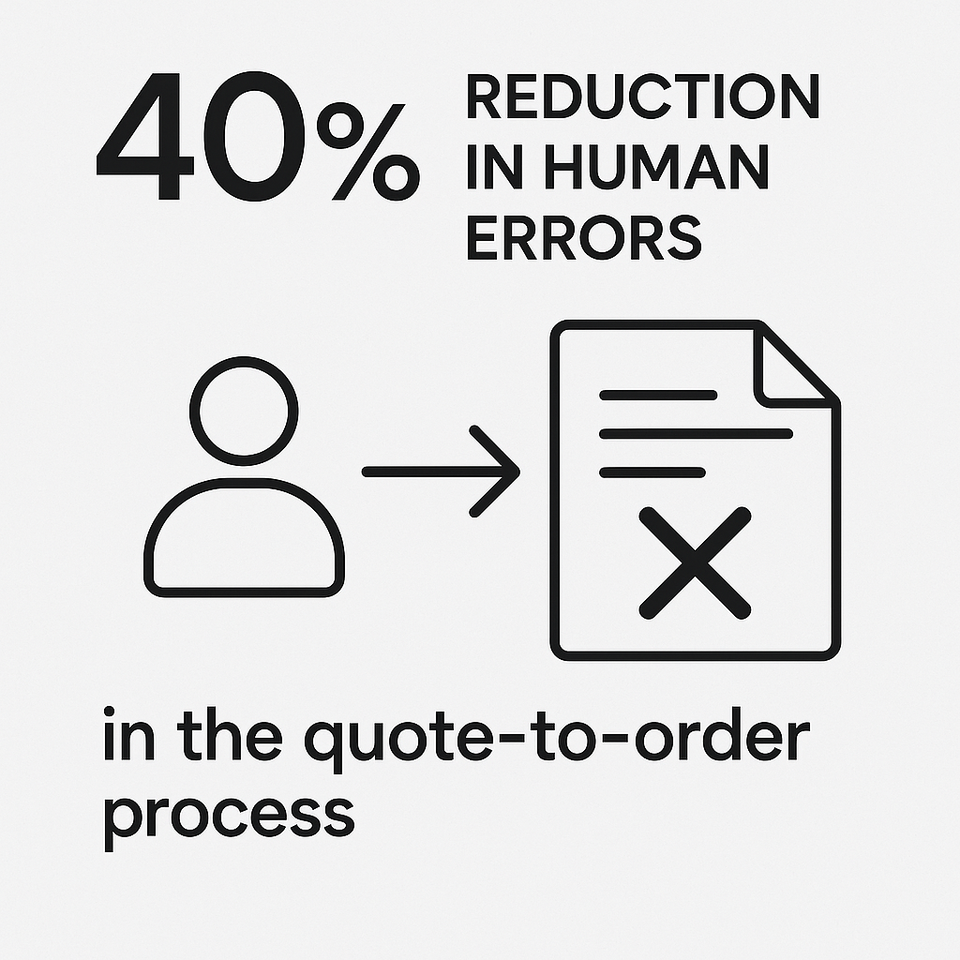Customers expect accurate quotes in minutes, not days. Yet at many companies, sales teams still wrestle with spreadsheets and back-and-forth emails to price custom products. The result? Slow quotes, frustrated buyers, and lost deals.
Consider Siemens Energy’s experience — generating a complex turbine proposal once took up to eight weeks and hundreds of pages of engineering input. After adopting CPQ software, those same quotes are done in minutes. Such transformations are no longer a luxury; they’re increasingly common. In fact, in high-tech and manufacturing sectors, up to 80% of businesses now incorporate CPQ solutions to streamline sales.
Clearly, Configure, Price, Quote platforms have become game-changers, automating the quote process for speed, accuracy, and profit.
What Is a CPQ Platform?
A CPQ platform is a software tool that helps companies Configure products, set the right Price, and quickly generate a Quote for customers. In essence, it’s like a skilled digital assistant for sales teams — taking in the specifics of what a customer wants, ensuring the product configuration is valid, pulling the correct pricing (with all discounts or custom terms), and spitting out a polished proposal or quote document in a fraction of the time it would take manually.

CPQ Benefits
Below, we break down some of the major benefits of CPQ software and how they directly impact your business.
Faster quote creation and shorter sales process
Data shows that sales reps without CPQ take 73% more time to produce a typical quote or proposal compared to those using configure-price-quote solutions. By automating product configurations and pricing, CPQ allows sales teams to respond to inquiries with lightning speed. And speed matters: the first vendor to deliver a quote wins significantly more deals — roughly 50% more — than slower competitors.
Accelerated onboarding
Bringing new salespeople up to speed is another area where CPQ shines. In many organizations, rookie reps face a steep learning curve: they must memorize product catalogs, pricing rules, and approval processes before they can independently create quotes. CPQ platforms act as a built-in coach for new hires. The software’s guided selling and automatic rules mean even a novice can configure products correctly and produce error-free quotes by following on-screen prompts. This dramatically reduces training time. In fact, companies have reported that modern configure, price, quote tools slash sales rep onboarding times by as much as 85%.
Less manual work (and fewer mistakes)
By automating configurations and pricing calculations, it frees up sales reps from administrative tasks so they can spend more time actually selling (currently, reps spend only about 34% of their time on active selling, on average — CPQ helps boost that percentage by taking care of the busywork).
Fewer manual steps also mean fewer mistakes. Typos, misquoted prices, or missing line items can kill deals or erode margins. CPQ software virtually eliminates those errors by enforcing valid combinations and precise pricing. One industry roundup found that configure-price-quote software can eliminate 40% of human errors in the quote-to-order process.
Enhanced sales support
Studies have found businesses using CPQ see a 32% improvement in alignment between sales, engineering, and production teams. When salespeople have confidence that the quote they generate is already vetted for technical accuracy and profitability, they’re effectively getting support from the entire organization in real-time. No more hunting down a product manager for a special approval or chasing an engineer to verify compatibility — the CPQ system has those rules encoded.

Top 10 CPQ Platforms
Below are the top 10 CPQ platforms worth considering, along with what makes each stand out.
Salesforce CPQ
Salesforce CPQ is often considered the go-to choice for companies already using Salesforce’s CRM — and for good reason. This platform (originally known as SteelBrick before Salesforce acquired it) is deeply integrated into the Salesforce ecosystem. If your sales team “lives” in Salesforce, adding Salesforce CPQ feels seamless: reps can configure products and generate quotes without leaving their CRM interface. Salesforce CPQ shines in helping you close deals fast, thanks to robust product configuration and pricing modules.
Oracle CPQ
Oracle CPQ (formerly known as BigMachines before Oracle acquired it) is a heavyweight contender particularly suited for enterprise needs. Oracle has poured resources into this platform to ensure it can handle very complex product configurations and large-scale pricing rules. A standout feature is its advanced guided selling capabilities and the option for a fully automated self-service quoting pipeline. In fact, Oracle CPQ allows businesses to set up interactive web portals where customers or partners can configure products themselves, receive instant personalized pricing, and even place orders directly online. This essentially extends CPQ beyond internal sales teams to end-users — a big plus if you aim to empower customers or resellers with DIY quoting.
SAP CPQ
SAP CPQ comes from the enterprise software giant SAP and is designed to dovetail with SAP’s broader suite (like SAP ERP and CRM). If your company runs on SAP for CRM or you have SAP Sales Cloud, SAP CPQ will slot in naturally. One notable thing about SAP CPQ is its heritage: it evolved from SAP’s acquisition of CallidusCloud, so it’s built with complex sales scenarios in mind. SAP CPQ is particularly adept at handling complex product configurations and large quote volumes. In fact, SAP touts that its automation can generate up to 10,000 quotes in seconds for bulk operations — useful for enterprises doing high volume transactional quotes or updates.
Where SAP CPQ really differentiates is the lead-to-cash integration if you’re an SAP shop. A salesperson using SAP CPQ can be confident that the quote they create is using up-to-date data from SAP’s ERP (like latest inventory or pricing), and once the customer signs, that quote can convert to an order in SAP with one click. This reduces errors from re-keying data and speeds up fulfillment. SAP CPQ also offers strong guided selling functionality and centralized quote management.
ConnectWise Sell (ConnectWise CPQ)
ConnectWise Sell, recently rebranded as ConnectWise CPQ, is a CPQ platform tailored for the IT services industry and managed service providers (MSPs). If you’re in a business reselling technology solutions – such as IT infrastructure, software licenses, or tech support services – ConnectWise was practically built for you. It streamlines quote and proposal generation for technology service providers, with features that address their unique needs. For example, ConnectWise CPQ integrates with major IT distributors like Ingram Micro and Tech Data to pull live pricing and availability for hardware and software right into your quotes. No more manually updating cost spreadsheets; the system fetches real-time distributor pricing so your quotes are always accurate and margin-controlled.
Conga CPQ
Conga CPQ (formerly Apttus CPQ) is another leading solution, known as a CPQ specialist or “pure-play” CPQ provider. Conga’s roots are in document generation and contract management, and their CPQ is a powerful extension of that expertise. A key selling point for Conga CPQ is its AI-powered features. Uniquely among many CPQ tools, Conga includes an AI assistant (branded Conga Max) that can, for instance, predict the likelihood of a quote closing successfully. This kind of “transaction intelligence” gives sales reps an edge — if the AI suggests a low probability of closing, maybe the rep needs to adjust pricing or bundle differently. Conga Max can also provide upsell or cross-sell recommendations by analyzing past deals, helping increase deal value. Essentially, Conga is infusing machine learning to make quotes not just faster, but smarter.
Conga CPQ covers all the standard CPQ bases too: product configuration rules, discounting workflows, quote document generation, and e-signature (Conga is known for its document tools, after all). It’s highly regarded on Salesforce’s AppExchange — many Salesforce CRM customers deploy Conga CPQ to extend quoting capabilities, and it also integrates with Microsoft Dynamics CRM and others. Users often praise Conga’s flexibility in handling complex pricing models and its robust contract management tie-in. For instance, you can configure a quote and then one-click generate a tailored contract from it, since Conga also provides CLM (contract lifecycle management) solutions.
DealHub CPQ
DealHub CPQ has been gaining traction as a modern, user-friendly CPQ solution, especially appreciated for its CRM integrations and guided selling approach. DealHub stands out for its native integration with HubSpot CRM — in fact, it’s often touted as the best CPQ for HubSpot users. This is notable because many CPQ tools historically focused on Salesforce; DealHub recognized the growing market of HubSpot-based sales teams and built a seamless experience for them. With DealHub, a rep using HubSpot can initiate a quote right from a deal record, configure products, get approvals, and generate a proposal PDF without leaving the HubSpot interface. All the quote data then syncs back to HubSpot, ensuring the CRM is always up to date. This tight coupling eliminates duplicate data entry and keeps sales processes unified – a big time-saver and error-reducer.
PandaDoc
PandaDoc is a bit unique on this list. It started primarily as a document generation and eSignature instrument for sales documents (like proposals and contracts), but over time PandaDoc has added CPQ-like capabilities including quoting, pricing tables, and product catalogs. The result is a platform that’s especially attractive to small and mid-sized businesses looking for a simple, affordable CPQ solution that also handles the entire proposal and contract workflow. PandaDoc allows sales reps to create quotes using pre-built pricing tables that can pull in products, descriptions, quantities, and apply taxes or discounts. It may not handle extremely complex configuration rules like a manufacturing CPQ would, but for most straightforward quoting needs, it’s quite powerful.
FPX CPQ
FPX CPQ is a veteran in the CPQ space with a strong pedigree in manufacturing and industrial applications. Now part of the Revalize suite (after an acquisition), FPX has carved out a niche focusing on companies that sell complex equipment in industries like automotive, heavy machinery, and material handling. In those environments, quotes aren’t just about prices – they often involve intricate configurations, engineering validations, and integration with CAD or PLM (Product Lifecycle Management) systems. FPX CPQ excels at this. It provides a powerful rules engine to configure highly complex products (imagine configuring an entire piece of industrial machinery with thousands of components), and it can even generate related outputs like Bills of Materials (BOMs) or CAD drawings as part of the quote process.
One of FPX’s distinguishing features is its breadth of integrations and modules for the manufacturing lifecycle. Beyond CPQ, FPX offers modules or connects to systems for PLM, engineering simulation, and more, meaning sales and engineering teams can work off the same platform to ensure the configured product is both sellable and buildable. This tight alignment can dramatically cut down the back-and-forth between sales and engineering. FPX also supports scenario quoting (budgetary quotes, multiple configurations) which is useful for big projects that might have phases or optional add-ons.
PROS Smart CPQ
PROS CPQ (sometimes called PROS Smart CPQ) comes from PROS, a company renowned for its dynamic pricing and AI-based solutions. As such, PROS CPQ’s claim to fame is intelligence and optimization. It doesn’t just help you create quotes; it actively helps you create better quotes. This platform leverages machine learning to analyze your sales data, customer behavior, and even external market data to recommend optimal pricing and profitable configurations. One unique feature that PROS highlights is a churn prediction tool — it tracks customer behavior and, using AI, can predict if a customer is likely to churn and recommend proactive offers to retain them. This kind of insight is invaluable for subscription businesses or any company where repeat sales are important.
IBM CPQ (IBM Sterling CPQ)
IBM CPQ, also known as IBM Sterling Configure, Price, Quote is IBM’s offering in this space and is geared towards enterprises that need a full-suite solution tightly integrated with e-commerce and order management. IBM Configure, Price, Quote is designed to modernize complex selling, especially in environments where you have multiple sales channels (online store, field sales, call centers, channel partners, etc.). One of its key strengths is enabling all these personas – from a buyer on an ecommerce site to a call center rep — to configure complex products seamlessly on one platform. For example, a retail customer on a website could configure a custom computer, a sales rep could do the same in-store or over the phone using the Configure, Price, Quote, and a partner could configure a special bundle via a partner portal — IBM Configure, Price, Quote can power all those scenarios with consistency.
CPQ Solutions By CanvasLogic
CanvasLogic offers CPQ solutions that marry the traditional configure-price-quote process with cutting-edge visualization and augmented reality (AR). CanvasLogic’s CPQ is designed to make selling complex, customizable products not just efficient, but also engaging for the customer. It does this by combining a powerful rules-driven configurator and pricing engine with photorealistic 3D product visuals and AR experiences. In practice, that means a customer (or sales rep) configuring a product can see it rendered in 3D in real time, rotate it, zoom in on details, and even project it into their physical space via AR — all while the system is calculating prices on-the-fly for each selection.
Imagine you’re selling a high-end custom sofa or a piece of industrial equipment. With CanvasLogic, as options like fabric or attachments are toggled, the customer can see the sofa in their living room through their phone’s camera, or the engineer can visualize the machine on the factory floor via AR. This immersive experience not only wows customers but gives them confidence that the configuration meets their needs. The impact on sales can be dramatic: visual CPQ experiences keep customers engaged 40% longer than static product pages, and this deeper engagement can boost conversion rates by 30-40% on average.
Conclusion
CPQ platforms exemplify the promise of technology in business — taking a complex, error-prone task and turning it into a streamlined, intelligent process. They blend the science of automation with the art of selling. So, if your sales operation is due for a 21st-century upgrade, consider the platforms on this list. The right Configure, Price, Quote could very well become the secret sauce that propels your business to the next level — faster quotes, happier customers, bigger wins, and a sales team that wouldn’t dream of going back to the old ways.
FAQ
What industries benefit the most from CPQ software?
Industries with complex products, services, or pricing see the strongest impact from CPQ software. Manufacturing is a prime example – companies that produce configurable products (machinery, electronics, industrial equipment, etc.) rely on Configure, Price, Quote to handle myriad options and ensure accurate buildable configurations.
What are the key features to look for in a CPQ platform?
When evaluating CPQ platforms, there are several core features you’ll want to ensure are present. First, a dynamic product configurator with a strong rules engine is essential – this is what handles the “Configure” part, making sure only valid combinations are allowed and guiding the user through options. Second, a pricing engine that supports your models: look for dynamic pricing capabilities, such as volume-based pricing, discount schedules, subscription billing, and the ability to handle one-off adjustments. Integration is key too, so a good Configure, Price, Quote should integrate with CRM and ERP systems to pull customer data and push orders downstream. Another feature to look for is automated quote/document generation – the platform should generate professional proposals or quotes (often in PDF or Word format) with your branding at the click of a button. Approval workflows are also important; the Configure, Price, Quote should let you set up rules like “if discount >20%, require VP approval” and route quotes accordingly.
How does AI enhance modern CPQ solutions?
AI enhances Configure, Price, Quote by making it smarter: optimizing prices, suggesting optimal configurations, automating proposal writing, and offering strategic insights. It transforms Configure, Price, Quote from a process execution tool into a proactive deal advisor, enabling sales teams to quote not just faster, but more cleverly and successfully.



